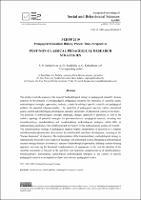Показать сокращенную информацию
POST-NON-CLASSICAL PEDAGOGICAL RESEARCH STRATEGIES
| dc.contributor.author | Seviaryn, S. N. | |
| dc.contributor.author | Saidzi, A. Ev. | |
| dc.contributor.author | Kukushkina, A. G. | |
| dc.date.accessioned | 2020-09-25T06:27:56Z | |
| dc.date.available | 2020-09-25T06:27:56Z | |
| dc.date.issued | 2020 | |
| dc.identifier.citation | The article reveals the essence of the concept “methodological strategy of pedagogical research”, focuses attention on the potential of polyparadigmin pedagogical research, the alternative of scientific ideals, methodological strategies, approaches, methods, criteria for solving a specific scientific and pedagogical problem, the potential polyconceptuality – the variability of pedagogical concepts (values, educational goals), content and technologies, development scenarios and models of educational systems of the future. The hierarchy of methodological concepts (paradigm, strategy, approach) is presented, as well as the author’s typology of potential strategies for post-non-classical pedagogical research, including into monodisciplinary, interdisciplinary and transdisciplinary methodological strategies, which differ in methodological guidelines, type of reflection and the “nature” of the methodological sources of research. The transdisciplinary strategy of pedagogical research implies interpretation of educat | ru_RU |
| dc.identifier.issn | e-ISSN: 2357-1330 | |
| dc.identifier.uri | http://rep.brsu.by:80/handle/123456789/1452 | |
| dc.description.abstract | The article reveals the essence of the concept “methodological strategy of pedagogical research”, focuses attention on the potential of polyparadigmin pedagogical research, the alternative of scientific ideals, methodological strategies, approaches, methods, criteria for solving a specific scientific and pedagogical problem, the potential polyconceptuality – the variability of pedagogical concepts (values, educational goals), content and technologies, development scenarios and models of educational systems of the future. The hierarchy of methodological concepts (paradigm, strategy, approach) is presented, as well as the author’s typology of potential strategies for post-non-classical pedagogical research, including into monodisciplinary, interdisciplinary and transdisciplinary methodological strategies, which differ in methodological guidelines, type of reflection and the “nature” of the methodological sources of research. The transdisciplinary strategy of pedagogical research implies interpretation of education as a complex multidimensional phenomenon characterized by multifactorial, non-linear development; centering on the “human dimension” of education. The implementation of the transdisciplinary methodological strategy is represented as the result of convergence of pedagogy with culture and science. Designing a methodological research strategy demands to construct a system of methodological approaches, defining a system-forming approach, and ensuring the functional complementarity of approaches. In this case the attention of the scientific community is focused on the specificity and functional complementarity of interdisciplinary, transdisciplinary, humanitarian, technological methodological strategies in the context of specific pedagogical research as an imperative of post-non-classical pedagogical science | ru_RU |
| dc.language.iso | en | ru_RU |
| dc.publisher | European Proceedings of Social and Behavioural Sciences EpSBS | ru_RU |
| dc.subject | Interdisciplinary | ru_RU |
| dc.subject | transdisciplinary | ru_RU |
| dc.subject | technological strategies of research | ru_RU |
| dc.title | POST-NON-CLASSICAL PEDAGOGICAL RESEARCH STRATEGIES | ru_RU |
| dc.type | Article | ru_RU |
